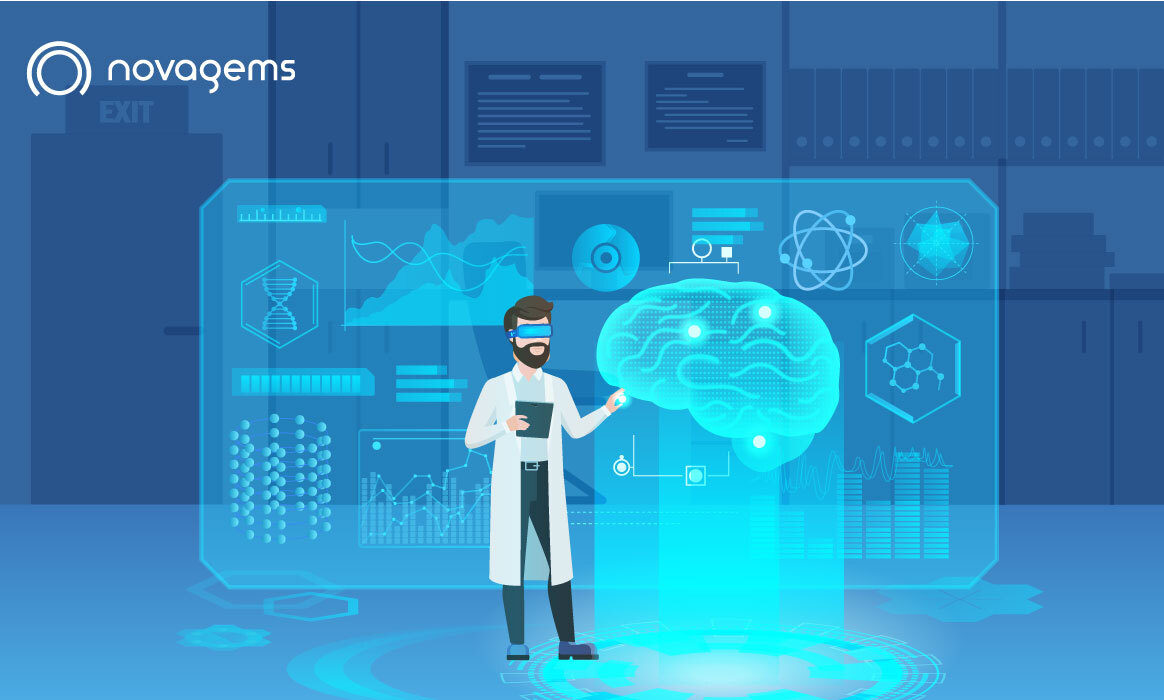Artificial Intelligence (AI) in Healthcare
Wed, Aug 2, 2023
Read in 5 minutes

Artificial Intelligence (AI) is transforming the healthcare industry, ushering in a new era of innovative patient care. From medical diagnostics to personalized treatment plans, AI is revolutionizing how healthcare professionals approach their practice. This blog explores the incredible potential of AI in healthcare, its various applications, ethical considerations, and the promising future it holds for the medical field.
The Impact of AI on Healthcare
The impact of AI on healthcare has been transformative and holds great promise for the future. AI technologies are being integrated into various aspects of healthcare, from diagnostics and treatment to administrative tasks and patient engagement.
Personalized Medicine
AI enables the analysis of individual patient data, including genetics, lifestyle, and environmental factors, to tailor treatments to each patient’s unique needs. This approach improves treatment efficacy and reduces adverse effects.
Predictive Analytics
AI can analyze patient data to predict disease outbreaks, identify high-risk patients, and improve hospital resource management. This helps healthcare providers be more proactive in patient care and resource allocation.
Administrative Efficiency
AI can streamline administrative tasks, such as scheduling appointments, managing medical records, and processing insurance claims. This leads to cost savings and allows healthcare professionals to focus more on patient care.
Remote Monitoring and Telemedicine
AI technologies facilitate remote patient monitoring, allowing healthcare providers to track patients’ health conditions in real-time. Telemedicine platforms supported by AI enable remote consultations and diagnostics, particularly useful in rural or underserved areas.
Enhancing Patient Care Through AI
Enhancing patient care through AI has the potential to revolutionize healthcare in numerous ways. AI technologies can process vast amounts of data, identify patterns, and provide actionable insights that can lead to more accurate diagnoses, personalized treatments, improved patient outcomes, and enhanced overall healthcare experiences.
Virtual Health Assistants
AI-powered virtual health assistants and chatbots can provide patients with 24/7 access to basic medical information, answer common health-related questions, and offer guidance on self-care. This can alleviate the burden on healthcare providers and empower patients to take better control of their health.
Remote Patient Monitoring
AI can enable continuous monitoring of patients with chronic conditions or those recovering from surgeries at home. Through wearable devices and other sensors, AI can analyze real-time data, detect anomalies, and alert healthcare providers if intervention is needed.
Treatment Applications
AI can help identify patients at higher risk of developing specific health conditions or experiencing complications. By analyzing patient data, AI algorithms can provide predictive analytics, allowing healthcare providers to take proactive measures to prevent adverse events. Having AI based treatment applications will enhance the overall operations and store the data in a centralized platform.
Efficient Healthcare Operations
AI can optimize hospital operations by predicting patient admission rates, improving scheduling, and optimizing resource allocation, leading to reduced waiting times and better patient flow.
Addressing Healthcare Challenges With AI
As the healthcare industry is increasing its use of AI in their daily operations the question also arises what challenges it will face while implementing artificial intelligence.
Data Privacy And Security
The integration of AI in various applications requires extensive data collection, processing, and storage, which can lead to potential vulnerabilities and risks. The industry needs to prepare themselves for these threats as well so that no sensitive data is lost. Main threats the healthcare industry need to lookout for are-
- Data Breaches and Cyber Attacks
- Data Sharing and Third-Party Risks
- Privacy Violations
By adopting robust data protection measures, promoting ethical AI governance, and prioritizing transparency and explainability, we can harness the potential of AI while safeguarding individuals’ privacy rights and ensuring data security.
Collaborative efforts between stakeholders, including governments, organizations, and the public, are essential to strike a balance between innovation and privacy protection in the age of AI.
Future Prospects Of AI In The Healthcare Industry
The future prospects of Artificial Intelligence (AI) in the healthcare industry are incredibly promising. As AI continues to advance and evolve, it is expected to play a transformative role in various aspects of healthcare delivery, research, and patient outcomes. Here are some key future prospects of AI in the healthcare industry.
Early Disease Detection and Prevention
AI-powered diagnostic tools will become more accurate and efficient, enabling early detection of diseases and conditions. By catching health issues at their earliest stages, healthcare professionals can intervene promptly, leading to better patient outcomes and reduced healthcare costs.
Drug Discovery and Development
AI will significantly expedite the drug discovery and development process. By analyzing vast datasets and simulating drug interactions, AI can identify potential drug candidates faster, leading to the discovery of novel treatments for various diseases.
Robot-Assisted Surgery
AI-driven robotic systems will continue to improve surgical precision and outcomes. Surgeons can benefit from AI assistance in real-time, providing valuable insights and enhancing their skills during complex procedures.
Healthcare Resource Management
AI will optimize healthcare operations by predicting patient admission rates, staffing needs, and equipment requirements. Hospitals and clinics can efficiently allocate resources, streamline workflows, and enhance patient satisfaction. This will help in streamlining the tasks and reaching maximum productivity.
AI-Driven Clinical Decision Support
AI-powered clinical decision support systems will assist healthcare providers in making well-informed decisions by analyzing patient data, medical literature, and treatment guidelines.
AI in Mental Health Care
AI will play an essential role in advancing mental health care by providing personalized interventions, monitoring patients’ mental well-being, and improving access to mental health resources.
Conclusion
As AI technologies continue to advance, it will be essential to address challenges related to data privacy, regulatory compliance, and ethical considerations. AI as a powerful ally, the healthcare industry is poised to make significant strides towards providing better patient outcomes, reducing healthcare costs, and improving overall population health.
Get a Free Trial
Sign up For Newsletter
Latest Blog Posts
Get Started
Start being productive & grow your business
with Novagems




